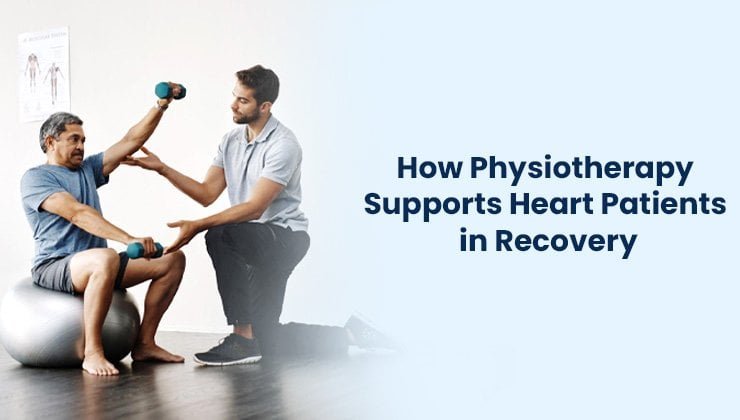Cardiovascular diseases continue to be a leading cause of death globally, largely driven by sedentary lifestyles, chronic stress, and unhealthy dietary choices. While medications and surgical interventions are often necessary, physiotherapy is a cost-effective approach that may help prevent cardiac events and support recovery after cardiac events or surgeries.
In this blog post, let us explore the different ways physiotherapy contributes to heart disease recovery and overall heart health improvement.
How Physiotherapy Helps In Heart Health?
Physiotherapy plays an important role in supporting heart health by offering tailored interventions that address the unique needs of individuals with cardiovascular conditions. It aids in promoting recovery, improving quality of life, and reducing the risk of future cardiac complications.
It helps patients to rebuild strength, increase endurance, and improve circulation following a cardiac event, thereby enhancing functional capacity and independence.
Physiotherapists design personalised exercises and rehabilitation programs that aid in alleviating symptoms, including chest pain, breathlessness, and swelling and provide relief for the patients.
Over time, research has shown that physiotherapy may lower the risk of readmissions to the hospital, improve long-term survival rates, and increase the patient’s quality of life.
Benefits Of Physiotherapy In Heart Disease Recovery
Here are a few benefits of physiotherapy in cardiac recovery process:
- Improved Cardiovascular Fitness
Physiotherapy incorporates aerobic exercises, including walking, cycling or treadmill workouts that may help strengthen the heart muscle, improve circulation and increase stamina. A stronger heart may help in pumping blood efficiently and reducing the strain during everyday activities.
- Helps Lower Blood Pressure and Cholesterol
One of the important benefits of physiotherapy is the ability to reduce hypertension and cholesterol levels naturally.
Regular physical activity guided by a physiotherapist may lead to lower resting blood pressure and reduce bad cholesterol while increasing good cholesterol and thereby preventing further cardiac issues.
- Enhances Respiratory Function
Cardiovascular conditions often lead to compromised lung function, leading to symptoms, including shortness of breath and reduced oxygen exchange. Physiotherapists incorporate targeted breathing exercises to strengthen the respiratory muscles and enhance lung capacity. It leads to better exercise tolerance, reduced fatigue, and a more effective overall recovery process.
- Maintaining a Healthy Body Weight
One of the key goals of physiotherapy is to help patients achieve and maintain a healthy body weight. It helps to reduce the strain on the heart and lower the risk of future cardiovascular events.
- Provide Psychosocial Support
Physiotherapy also plays an important role in supporting the mental and emotional well-being of patients. Many patients often experience anxiety, depression, and fear following a cardiac event.
Physiotherapy sessions are often conducted in group settings or with one-on-one coaching, offering emotional support, counselling, and motivation. This holistic approach contributes to overall improvement in quality of life.
- Helps in Cardiac Rehabilitation
Cardiac rehabilitation is a critical phase in the recovery process for individuals who have undergone heart surgery or suffered a cardiac event. It includes supervised exercise, education about heart health and lifestyle counselling.
Physiotherapists play an important role in the cardiac rehabilitation process, helping patients gradually return from hospital to everyday life. They may introduce low-impact exercises, including assisted walking, step training, and light strength-building activities to help rebuild stamina and improve cardiac output.
- Improved Quality of Life
Individuals who engage in physiotherapy after a cardiac disease report better energy levels, mobility, and physical independence. It helps them return to work and daily routines, thereby significantly improving their quality of life by enhancing physical functioning, emotional well-being, and social integration.
Types Of Physiotherapy In Cardiac Recovery
The physiotherapy used in recovery after a cardiac event may involve different techniques to support recovery, restore physical function, and reduce the risk of future heart problems. It includes
- Cardio exercise therapy: It involves low to moderate intensity aerobic exercises, including walking, cycling, or treadmill, to improve cardiovascular endurance and promote breathing. It can be gradually increased depending on the patient’s condition.
- Breathing exercises: They help improve lung function and reduce breathlessness, especially after heart surgery or in patients with heart failure.
- Resistance training: It includes light resistance exercises using weights or resistance bands to strengthen muscles. It helps improve physical function, reduce fatigue, and enhance overall mobility.
- Stretching exercises: Gentle stretching improves range of motion, reduces muscle stiffness, and prevents injury. It is important to support posture during recovery.
- Education and lifestyle counselling: It focuses on smoking cessation, diet, stress management, and medication adherence.
- Psychosocial support: It includes counselling or group therapy to help patients deal with anxiety, depression, or fear related to a heart condition and encourage emotional resilience.
Conclusion
Physiotherapy plays an important role in the recovery after a cardiac event and long-term management of heart disease. It helps in restoring physical function, enhances support for well-being and supports return to daily activities under the guidance of trained professionals. It may also significantly improve health outcomes, reduce hospital readmissions, and enhance quality of life.
If you or a loved one is recovering from a cardiac event or surgery, please consider booking a consultation with Dr Nikhil P J Thekumparampil to explore a tailored physiotherapy program to support the cardiac recovery journey. ay book a consultation with Dr Nikhil P J Thekumparampil for expert guidance and personalised care.
Frequently Asked Questions
Physiotherapists play an important role in preventing heart disease by promoting regular physical activity, educating patients on healthy lifestyle choices, and managing risk factors, including obesity and hypertension. It helps in improving cardiovascular health, reducing stress and preventing the progression of heart conditions.
Physiotherapy can be highly effective in preventing heart conditions, especially when combined with lifestyle modifications. A regular exercise program designed by physiotherapists helps improve cardiovascular fitness, lower blood pressure, regulate blood sugar, and support healthy weight management. Overall, it helps prevent heart conditions by reducing the associated risk factors.
Physiotherapy is highly effective in supporting recovery after a cardiac event, including a heart attack or heart surgery. It may help patients gradually regain strength, improve cardiovascular endurance, and restore functional independence. It may further help reduce the risk of future cardiac events and lower readmission to the hospital, and enhance overall quality of life.
Physiotherapy techniques, including massage and exercises, may help improve blood circulation by making the heart pump more efficiently and ensuring that all the tissues receive the oxygen and nutrients required for healing. Also, it helps in reducing swelling and lowering the risk of blood clots.
Yes, physiotherapy is safe after heart surgery, especially when performed under the supervision of a physiotherapist. It helps patients regain mobility, improve breathing, build strength, and prevent complications. It supports the patient’s gradual return to daily activities while reducing the risk of future heart problems.









